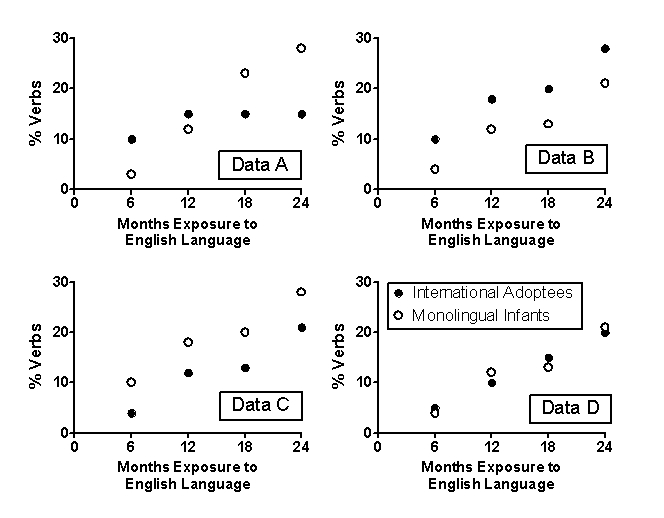Use the following to answer questions :
Scenario I
The scenario is based on and presents results consistent with the following studies:
Snedeker,J. ,Geren,J. ,& Shafto,C.L.(2007) .Starting over: International adoption as a natural experiment in language development.Psychological Science,18(1) ,79-87.doi:10.1111/j.1467-9280.2007.01852.x
Snedeker,J. ,Geren,J. ,& Shafto,C.L.(2012) .Disentangling the effects of cognitive development and linguistic expertise: A longitudinal study of the acquisition of English in internationally-adopted children.Cognitive Psychology,65(1) ,39-76.doi:10.1016/j.cogpsych.2012.01.004
Language development occurs in orderly stages,beginning with one-word utterances and progressing to two-word utterances,simple sentences containing function morphemes,and the emergence of grammatical rules.Psycholinguists have attempted to determine if language development is a consequence of cognitive development or if it reflects linguistic processes that occur independently of general cognitive development.Studies on the acquisition of a second language in internationally adopted children have provided insight into this research question.In a series of studies,Snedeker and colleagues (2007,2012) studied the acquisition of the English language in adopted preschoolers from China.These children had no exposure to the English language before being adopted by families in the United States.
Figure 9.1 
-(Scenario I) In a second study,Snedeker and colleagues (2012) found that older (e.g. ,5 year-old) internationally adopted children acquiring English as a second language began correctly using words pertaining to time (e.g. ,yesterday,tomorrow) earlier in their exposure to English than did monolingual infant controls.This observed difference is BEST interpreted as:
Definitions:
Market Price
The current price at which a good or service can be bought or sold in a competitive market.
Break-Even Price
The price point at which total revenues equal total costs, resulting in no profit or loss for the business, used as a measure of financial sustainability.
Variable Costs
Expenses that vary in relation to a company's production volume or operational activities.
Lawn-Mowing Service
A business that provides the service of cutting the grass on residential or commercial properties.
Q1: Who conducted pioneering research on the "fast"
Q2: The heritability coefficient of intelligence is estimated
Q30: B.F.Skinner studied rats' behaviour that was _
Q37: By today's standards,Milgram's study on obedience is
Q71: Someone with a prevention focus probably will:<br>A)score
Q86: _ stimulates eating,while _ suppresses it.<br>A)Leptin;ghrelin<br>B)Leptin;glucagon<br>C)An anorexigenic
Q135: By best estimates,spoken human language emerged _
Q196: Ellie is a Girl Scout who goes
Q199: A rock guitarist no longer derives the
Q361: Patients with prefrontal cortex damage make more